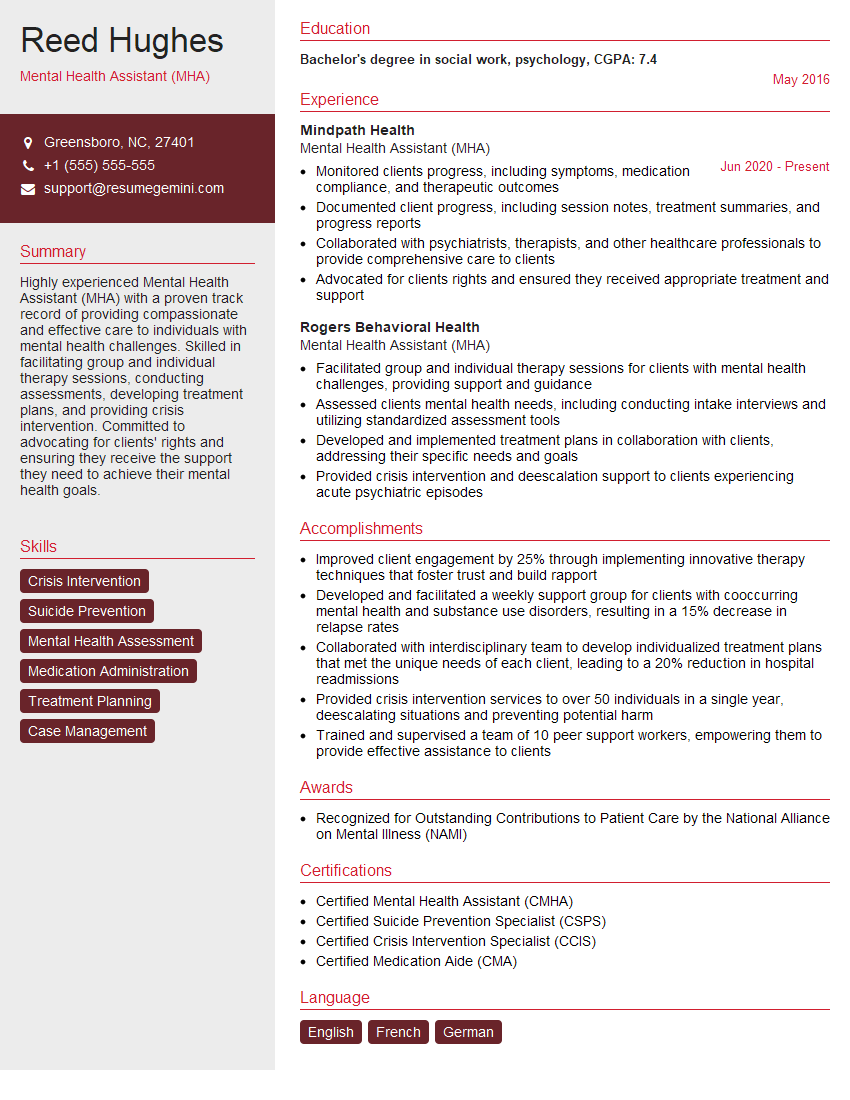Are you a seasoned Mental Health Assistant (MHA) seeking a new career path? Discover our professionally built Mental Health Assistant (MHA) Resume Template. This time-saving tool provides a solid foundation for your job search. Simply click “Edit Resume” to customize it with your unique experiences and achievements. Customize fonts and colors to match your personal style and increase your chances of landing your dream job. Explore more Resume Templates for additional options.

Reed Hughes
Mental Health Assistant (MHA)
Summary
Highly experienced Mental Health Assistant (MHA) with a proven track record of providing compassionate and effective care to individuals with mental health challenges. Skilled in facilitating group and individual therapy sessions, conducting assessments, developing treatment plans, and providing crisis intervention. Committed to advocating for clients’ rights and ensuring they receive the support they need to achieve their mental health goals.
Education
Bachelor’s degree in social work, psychology
May 2016
Skills
- Crisis Intervention
- Suicide Prevention
- Mental Health Assessment
- Medication Administration
- Treatment Planning
- Case Management
Work Experience
Mental Health Assistant (MHA)
- Monitored clients progress, including symptoms, medication compliance, and therapeutic outcomes
- Documented client progress, including session notes, treatment summaries, and progress reports
- Collaborated with psychiatrists, therapists, and other healthcare professionals to provide comprehensive care to clients
- Advocated for clients rights and ensured they received appropriate treatment and support
Mental Health Assistant (MHA)
- Facilitated group and individual therapy sessions for clients with mental health challenges, providing support and guidance
- Assessed clients mental health needs, including conducting intake interviews and utilizing standardized assessment tools
- Developed and implemented treatment plans in collaboration with clients, addressing their specific needs and goals
- Provided crisis intervention and deescalation support to clients experiencing acute psychiatric episodes
Accomplishments
- Improved client engagement by 25% through implementing innovative therapy techniques that foster trust and build rapport
- Developed and facilitated a weekly support group for clients with cooccurring mental health and substance use disorders, resulting in a 15% decrease in relapse rates
- Collaborated with interdisciplinary team to develop individualized treatment plans that met the unique needs of each client, leading to a 20% reduction in hospital readmissions
- Provided crisis intervention services to over 50 individuals in a single year, deescalating situations and preventing potential harm
- Trained and supervised a team of 10 peer support workers, empowering them to provide effective assistance to clients
Awards
- Recognized for Outstanding Contributions to Patient Care by the National Alliance on Mental Illness (NAMI)
Certificates
- Certified Mental Health Assistant (CMHA)
- Certified Suicide Prevention Specialist (CSPS)
- Certified Crisis Intervention Specialist (CCIS)
- Certified Medication Aide (CMA)
Career Expert Tips:
- Select the ideal resume template to showcase your professional experience effectively.
- Master the art of resume writing to highlight your unique qualifications and achievements.
- Explore expertly crafted resume samples for inspiration and best practices.
- Build your best resume for free this new year with ResumeGemini. Enjoy exclusive discounts on ATS optimized resume templates.
How To Write Resume For Mental Health Assistant (MHA)
- Highlight your experience in providing mental health services to diverse populations.
- Quantify your accomplishments whenever possible, using specific numbers or metrics to demonstrate your impact.
- Showcase your skills in crisis intervention and de-escalation techniques.
- Emphasize your commitment to providing culturally competent and trauma-informed care.
Essential Experience Highlights for a Strong Mental Health Assistant (MHA) Resume
- Facilitating group and individual therapy sessions for clients with mental health challenges
- Assessing clients’ mental health needs through intake interviews and standardized assessment tools
- Developing and implementing personalized treatment plans in collaboration with clients
- Providing crisis intervention and de-escalation support to clients experiencing acute psychiatric episodes
- Monitoring clients’ progress, including symptoms, medication compliance, and therapeutic outcomes
- Documenting client progress, including session notes, treatment summaries, and progress reports
- Collaborating with psychiatrists, therapists, and other healthcare professionals to provide comprehensive care to clients
Frequently Asked Questions (FAQ’s) For Mental Health Assistant (MHA)
What is the role of a Mental Health Assistant (MHA)?
An MHA provides support and guidance to individuals with mental health challenges. They facilitate therapy sessions, conduct assessments, develop treatment plans, and provide crisis intervention. MHAs work under the supervision of licensed mental health professionals, such as psychiatrists or psychologists.
What qualifications are required to become an MHA?
Most MHAs have a bachelor’s degree in social work, psychology, or a related field. Some states may require MHAs to be certified or licensed.
What are the key skills and qualities of an effective MHA?
Effective MHAs have strong communication and interpersonal skills, empathy, and cultural sensitivity. They are also able to work independently and as part of a team, and are committed to providing compassionate and ethical care.
What is the job outlook for MHAs?
The job outlook for MHAs is expected to grow faster than average in the coming years, due to the increasing demand for mental health services.
What is the average salary for an MHA?
The average salary for an MHA varies depending on experience, location, and employer. MHAs working in hospitals or other healthcare settings typically earn higher salaries than those working in community-based settings.
What are the career advancement opportunities for MHAs?
MHAs can advance their careers by pursuing higher education, such as a master’s degree in social work or counseling. They can also specialize in a particular area of mental health, such as addiction or trauma.
What are the challenges of working as an MHA?
MHAs can face challenges due to the nature of their work, such as exposure to traumatic or distressing situations. It is important for MHAs to practice self-care and seek support when needed.